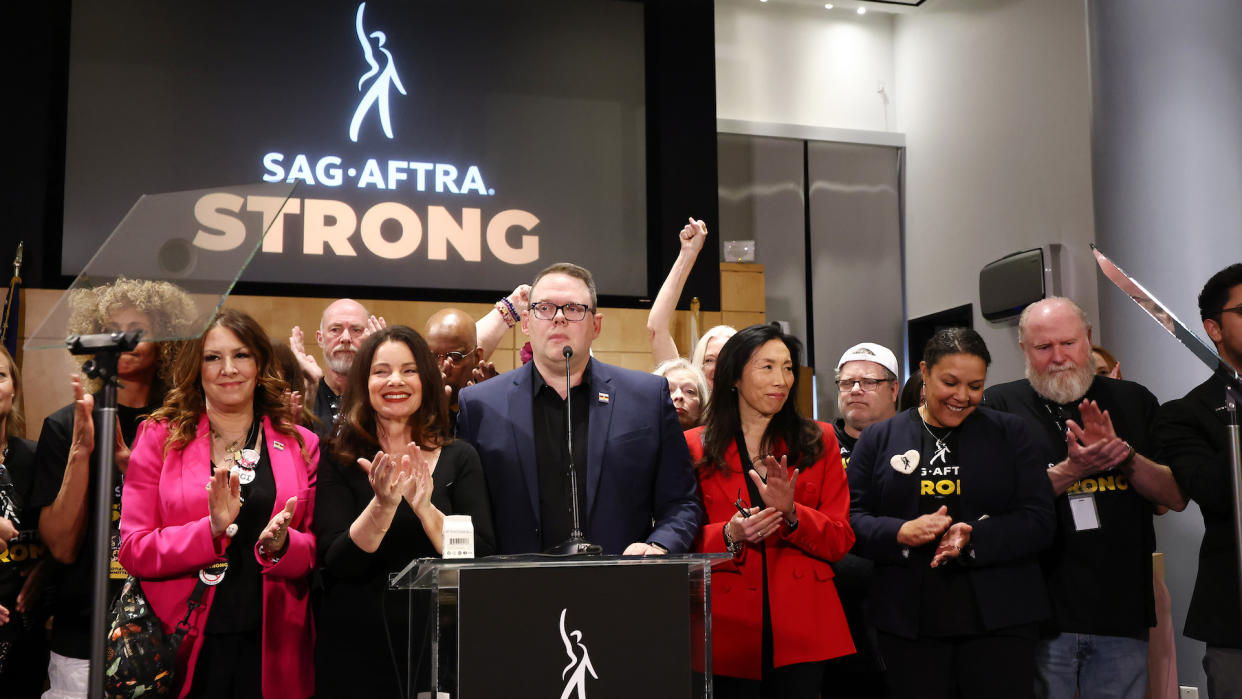Actors Approve New SAG-AFTRA Contract with 78.3% Voting in Favor

Actors are in favor of the new contract its guild has won from the studios, though not without some dissent among the ranks. SAG-AFTRA members have voted in favor of ratifying the new deal, with 78.33 percent of members who participated voting to approve the contract. The strike is officially over.
The guild said on December 5 that of the 38.15 percent voter turnout, 21.67 percent voted “No.” That’s far from the near-unanimous support with which WGA members ratified the writers deal earlier this fall. But in 2020, the last time the SAG-AFTRA contract came up for ratification, the actors union saw a turnout of just 27.15 percent of its members; 74.22 percent voted to approve it.
More from IndieWire
For Many Post-Production Houses, It's Like the Strikes Never Ended
Here's What SAG's $40 Million Streaming Bonus Means for the Average Actor
Actors will now work under this contract until June 30, 2026.
“I’m proud of our SAG-AFTRA membership,” said SAG-AFTRA President Fran Drescher in a statment sent to press. “They struck for 118 days to grant the TV/Theatrical Negotiating Committee the necessary leverage to secure over $1 billion in gains, along with the union’s first-ever protections around AI technology. Now they’ve locked in the gains by ratifying the contract. SAG-AFTRA members have remained incredibly engaged throughout this process, and I know they’ll continue their advocacy throughout our next negotiation cycle. This is a golden age for SAG-AFTRA, and our union has never been more powerful.”
“SAG-AFTRA members demanded a fundamental change in the way this industry treats them: fairness in compensation for their labor, protection from abusive use of AI technology, strengthened benefit plans, and equitable and respectful treatment for all members, among other things,” added SAG-AFTRA National Executive Director & Chief Negotiator Duncan Crabtree-Ireland. “This new contract delivers on these objectives and makes substantial progress in moving the industry in the right direction.”
The deal, which SAG-AFTRA says is valued at $1.11 billion over its three-year term, was largely expected to be ratified; it needed only a simple majority to pass. Yet since the strike was suspended on November 8, after nearly 17 weeks on the picket lines, several SAG-AFTRA members voiced concerns about the contract — particularly over its provisions around artificial intelligence.
In an X (fka Twitter) thread that went viral, Justine Bateman, the “Family Ties” star who was also an adviser to the guild on AI issues, said the AI protections did not go far enough. Bateman, the sister of Jason Bateman, said members should only ratify the deal “if they don’t want to work anymore.”
“Stranger Things” star Matthew Modine, who twice ran for guild president, announced that he voted against the deal. Modine felt it would create a tier-system benefitting only the top actors and harming those unwilling to consent to the use of AI. The AI issue is why SAG-AFTRA’s national board did not unanimously approve the tentative deal presented to it by the negotiating committee.
Of course (and clearly, per this vote), many actors were all for it. Negotiating committee member Michael Gaston sent a letter to members in November expressing the urgency of approving the deal and the stakes if members were to vote against it. Bryan Cranston presented his personal case for why he was voting “Yes” on the deal, despite what he acknowledged are imperfections. Those, he hopes, can be smoothed over in the future.
As part of the new contract, principal performers get a minimum-wage raise of 7 percent in the first year; background actors get 11 percent. They’ll all have AI protections, including mandated consent for performers who get digital scans on a production, as well as a requirement for a studio to get consent from an estate to use a digital scan of an actor who has died. Actors will also have access to a “streaming participation bonus” worth an estimated $40 million per year ($120 million throughout the full term of the deal), which provides extra residuals for successful streaming shows and movies.
Other gains include higher caps for SAG-AFTRA’s pension and health plans, guard rails around self-taped auditions, makeup and hairstyling requirements for performers of diverse hair and skin types, a requirement for intimacy coordinators, new language for motion-capture performers, and much more.
Best of IndieWire
The Best LGBTQ Movies and TV Shows Streaming on Netflix Right Now
Guillermo del Toro's Favorite Movies: 54 Films the Director Wants You to See
Nicolas Winding Refn's Favorite Films: 37 Movies the Director Wants You to See
Sign up for Indiewire's Newsletter. For the latest news, follow us on Facebook, Twitter, and Instagram.

 Yahoo News
Yahoo News 
